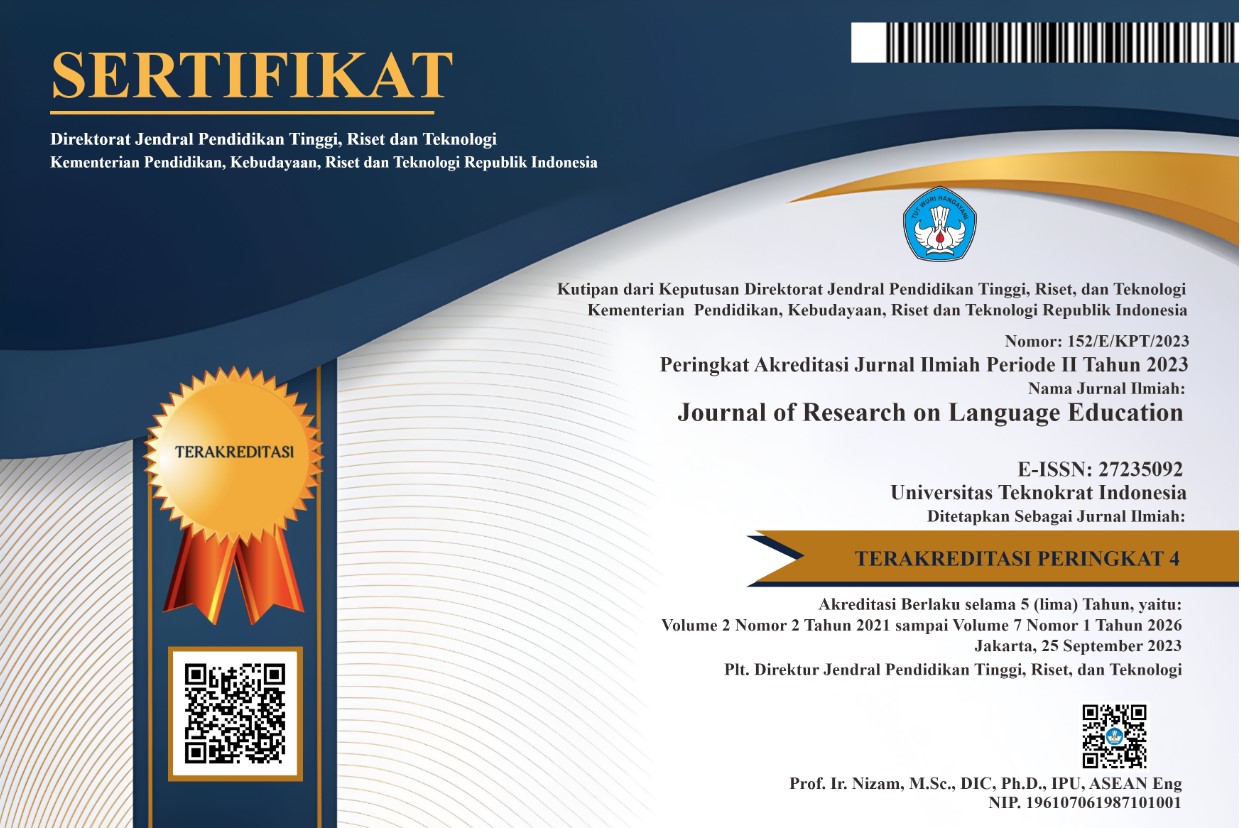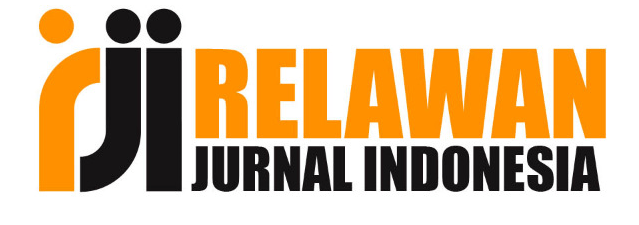THE INFLUENTIAL IMPACTS OF DIGITAL STORYTELLING TOWARDS THE IMPROVEMENT OF EFL LEARNERS’ SPEAKING SKILLS
Abstract
Abstract
In this ever-changing modern age, EFL educators are still in search of more meaningful speaking learning enterprises by which second language learners are strongly encouraged to endure various L2 communication practice hurdles to transform into more proficient speakers. One of the promising ways to actualize this speaking-learning aspiration is through the use of digital storytelling. Previous researchers believed that digital storytelling could potentially promote a higher degree of speaking learning enjoyment where EFL learners’ speaking competencies can thrive to the utmost potential. This present small-scale library study was initiated to exhaustively investigate the positive influences of digital storytelling on EFL learners’ speaking skills improvement. To release this main study objective, the researcher conducted a thematic analysis of 25 previous digital storytelling and speaking studies to generate more relevant and comprehensible research results. Based on the thematic analysis, the constant utilization of digital storytelling was proved to transform EFL learners into more insightful L2 speakers and promote a psychologically sound speaking learning atmosphere in which their targeted L2 communicative competencies can be fostered to the fullest development. Future researchers need to include broader English language learning scopes and a greater number of reviewed digital storytelling investigations to generate more rewarding research results relevant to the applicability and feasibility of online learning platforms in modern EFL learning enterprises.
Keywords: digital storytelling, speaking skills, library study
Keywords
Full Text:
PDFReferences
REFERENCES
Abdelmageed, M., & El-Naggar, Z. (2018). Digital storytelling enhances students’ speaking skills at Zewail university of science and technology in Egypt. Society for Information Technology & Teacher Education International Conference, December, 278–287.
Abdolmanafi-Rokni, S. J. (2014). Digital Storytelling in EFL Classrooms: The Effect on the Oral Performance. International Journal of Language and Linguistics, 2(4), 252. https://doi.org/10.11648/j.ijll.20140204.12
Amaliah, P. R., Sultan, S., & Amrullah, A. (2022). The Use of Digital Storytelling as A Strategy to Improve Students ’ English Speaking Skill at SMKN 1 Wajo The Use of Digital Storytelling as A Strategy to Improve Students ’ English Speaking Skill at SMKN 1 Wajo.
Anderson, A. A., Yeo, S. K., Brossard, D., Scheufele, D. A., & Xenos, M. A. (2018). Toxic Talk: How Online Incivility Can Undermine Perceptions of Media. International Journal of Public Opinion Research, 30(1), 156–168. https://doi.org/10.1093/ijpor/edw022
Arini, M., & Wahyudin, A. Y. (2022). Students’ Perception on Questionning Technique in Improving Speaking Skill Ability At English Education Study Program. Journal of Arts and Education, 2(1), 2022.
Arroba, J., & Acosta, H. (2021). Authentic digital storytelling as alternative teaching strategy to develop speaking skills in efl classes. LEARN Journal: Language Education and Acquisition Research Network, 14(1), 317–343.
Badawi, D. M. F., El Gabas, D. N. M., & Mohamed, N. E. A. (2022). The Effect of Using a Strategy Based on Digital Storytelling on Developing Primary School Pupils’ English Speaking Skills. Journal of Research in Curriculum Instruction and Educational Technology, 8(1), 121–147. https://doi.org/10.21608/jrciet.2022.213132
Bikowski, D., & Casal, J. E. (2018). Interactive digital textbooks and engagement: A learning strategies framework. Language Learning and Technology, 22(1), 119–136.
Elenein, A. H. A. A. (2019). The Effect of Utilizing Digital Storytelling on Developing Oral Communication Skills for 5th Grade Students at Rafah Primary Schools. SSRN Electronic Journal, 2016, 30–46. https://doi.org/10.2139/ssrn.3420857
Eva Riani, Husnawadi, S. (2021). Effects of digital storytelling-aided instruction on students’ narrative writing and speaking skills. English Language Education, 4(1), 140–156.
Fu, J. S., Yang, S. H., & Yeh, H. C. (2022). Exploring the impacts of digital storytelling on English as a foreign language learners’ speaking competence. Journal of Research on Technology in Education, 54(5), 679–694. https://doi.org/10.1080/15391523.2021.1911008
Febriyanti, M., & Susanto, S. (2017). The Use of Digital Storytelling Narrative Text to Improve Students Speaking Ability at Grade Ten SMAN 2 Bandar Lampung. LINGUISTIKA, 8(1). 31-37.
Guoying Yan, X. Z. (2019). A Review Of The Use Of Storytelling To Improve Students ’ Oral Proficiency In Efl Teaching. European Journal of English Language Teaching, 5(1), 44–62. https://doi.org/10.5281/zenodo.3334120
Hamad, M. M., Metwally, A. A., & Alfaruque, S. Y. (2019). The Impact of Using YouTubes and Audio Tracks Imitation YATI on Improving Speaking Skills of EFL Learners. English Language Teaching, 12(6), 191. https://doi.org/10.5539/elt.v12n6p191
Kristiawan, D., Ferdiansyah, S., & Picard, M. (2022). Promoting Vocabulary Building, Learning Motivation, and Cultural Identity Representation through Digital Storytelling for Young Indonesian Learners of English as a Foreign Language. Iranian Journal of Language Teaching Research, 10(1), 19–36. https://doi.org/10.30466/ijltr.2022.121120
Lambert, J. (2013). Digital storytelling: Capturing lives, creating community. Routledge.
Lambert, C., Kormos, J., & Minn, D. (2017). Task repetition and second language speech processing. Studies in Second Language Acquisition, 39(1), 167-196.
Mbato, C. L. (2020). Confronting Cultural Barriers in Public Speaking through Multiple Learning Strategies: A Case of Indonesian EFL Learners. Jurnal Humaniora, 32(1), 51. https://doi.org/10.22146/jh.53380
Merzifonluoğlu, A., & Gonulal, T. (2018). Review of Digital language learning and teaching: Research, theory, and practice. Language Learning and Technology, 22(1), 65-68.
Mirza, H. (2020). Improving University Students ’ English Proficiency. Iojet, 7(1), 84–94.
Mitra Zuana, M. M. (2018). Digital Storytelling: An Attractive Media to Teach Narrative Text in Speaking Class. ALSUNA : Journal of Arabic and English Language, 1(1), 26–39. https://doi.org/10.31538/alsuna.v1i1.124
Mohamed Salama Eissa, H. (2019). Pedagogic Effectiveness of Digital Storytelling in Improving Speaking Skills of Saudi EFL learners. Arab World English Journal, 10(1), 127–138. https://doi.org/10.24093/awej/vol10no1.12
Nair, V., & Md Yunus, M. (2022). Using Digital Storytelling to Improve Pupils’ Speaking Skills in the Age of COVID 19. Sustainability (Switzerland), 14(15). https://doi.org/10.3390/su14159215
Nair, V., & Yunus, M. M. (2021). A systematic review of digital storytelling in improving speaking skills. Sustainability (Switzerland), 13(17). https://doi.org/10.3390/su13179829
Nampaktai, P. (2018). The Use of Digital Storytelling in Fostering English Speaking Ability of Thai Secondary Students. Veridian E-Journal, Silpakorn University, 11(4), 1192–1206.
Natasia, G., & Angelianawati, L. (2022). Students’ Perception of Using Storytelling Technique to Improve Speaking Performance at SMPN 143 Jakarta Utara. JET (Journal of English Teaching), 8(2), 282–292. https://doi.org/10.33541/jet.v8i2.4063
Nurzaman, I. G. G. (2019). Developing Interactive Storytelling Model to Facilitate Young Learners ’ Speaking Skills. The 2nd International Conference on Elementary Education, 2, 6.
Ramalingam, K., Jiar, Y. K., & Mathiyazhagan, S. (2022). Speaking Skills Enhancement through Digital Storytelling among Primary School Students in Malaysia. International Journal of Learning, Teaching and Educational Research, 21(3), 22–35. https://doi.org/10.26803/ijlter.21.3.2
Razmi, M., Pourali, S., & Nozad, S. (2014). Digital Storytelling in EFL Classroom (Oral Presentation of the Story): A Pathway to Improve Oral Production. Procedia - Social and Behavioral Sciences, 98(2011), 1541–1544. https://doi.org/10.1016/j.sbspro.2014.03.576
Robin, B. R. (2016). The power of digital storytelling to support teaching and learning. Digital Education Review, 30, 17–29.
Saenboonsong, S., & Poonsawad, A. (2020). A Digital Storytelling on Video to Improve English Speaking Skills of Thai EFL Undergraduate Students. Language Education, Humanities, and Innovation, 17(7), 1-11.
Sanchez-Lopez, I., Perez-Rodriguez, A., & Fandos-Igado, M. (2020). The explosion of digital storytelling. Creator’s perspective and creative processes on new narrative forms. Heliyon, 6(9), e04809. https://doi.org/10.1016/j.heliyon.2020.e04809
Sinaga, R. R. F., & Oktaviani, L. (2020). the Implementation of Fun Fishing To Teach Speaking for Elementary School Students. Journal of English Language Teaching and Learning, 1(1), 1–6. https://doi.org/10.33365/jeltl.v1i1.245
Tahriri, A., Tous, M. D., & Movahedfar, S. (2015). The impact of digital storytelling on efl learners’ oracy skills and motivation. International Journal of Applied Linguistics and English Literature, 4(3), 144–153. https://doi.org/10.7575/aiac.ijalel.v.4n.3p.144
Tatlı, Z., Saylan, E., & Kokoç, M. (2022). Digital Storytelling in an Online EFL Course: Influences on Speaking, Vocabulary, and Cognitive Load. Participatory Educational Research, 9(6), 89–112. https://doi.org/10.17275/per.22.130.9.6
Wafa, E., & Chakim, N. (2022). the Use of Digital Storytelling To Enhance the Students’Speaking Ability. … Journal: International Journal of Education …, 2(3), 168–176. https://journal.unesa.ac.id/index.php/elite/article/view/16772
Wahyudin, A. Y. (2017). The Effect of Project-Based Learning on L2 Spoken Performance of Undergraduate Students in English for Business Class. 82(Conaplin 9), 42–46. https://doi.org/10.2991/conaplin-16.2017.9
Wei, Q., Siriyothin, P., & Lian, A. P. (2018). Improving Chinese University EFL Students’ Speaking Skills through Digital Storytelling. Suranaree Journal of Social Science, 12(2), 47–68. https://doi.org/10.55766/oxmz7550
Wijaya, K. F. (2021). English Education Master Students’ Perceptions on Their Self-Efficacy in Efl Speaking Learning Contexts. UC Journal: ELT, Linguistics and Literature Journal, 2(2), 105–118. https://doi.org/10.24071/uc.v2i2.3438
Yang, Y. T. C., Chen, Y. C., & Hung, H. T. (2022). Digital storytelling as an interdisciplinary project to improve students’ English speaking and creative thinking. Computer Assisted Language Learning, 35(4), 840–862. https://doi.org/10.1080/09588221.2020.1750431
Zamzam, F. (2020). Digital Storytelling to Improve Students’ Speaking Skill Fadhilah. Jurnal Studi Guru Dan Pembelajaran, 3(3), 524–528.
DOI: https://doi.org/10.33365/jorle.v4i2.2651
Refbacks
- There are currently no refbacks.

This work is licensed under a Creative Commons Attribution-NonCommercial-ShareAlike 4.0 International License.

Articles published in Journal of Research on Language Education is licensed
under a Creative Commons Attribution-ShareAlike 4.0 International License.
English Education Study Program, Faculty of Arts and Education.
Universitas Teknokrat Indonesia
Zainal Abidin Pagaralam 9-11 Bandar Lampung, Indonesia
All rights reserved.








